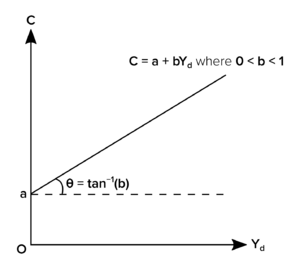Consumption function facts for kids
The consumption function is a big idea in economics. It helps us understand how much people spend. It shows the connection between how much money people have to spend (their disposable income) and how much they actually spend (their consumption).
What is the Consumption Function?
This idea was first shared by a famous economist named John Maynard Keynes in 1936. He used it to explain how government spending can affect the economy.
Understanding the Spending Formula
The simplest way to write the consumption function looks like this:
Let's break down what each part means:
- C stands for consumption. This is the total amount of money that households spend on goods and services.
- a stands for autonomous consumption. This is the money people spend even if they have no income at all. Think of it as the basic spending you need for things like food and shelter, even if you're not earning.
- b stands for the marginal propensity to consume (MPC). This is a fancy way of saying: how much more money do people spend when they get an extra dollar of disposable income? For example, if 'b' is 0.8, it means for every extra dollar you get, you spend 80 cents of it.
- Yd stands for disposable income. This is the money you have left to spend or save after taxes have been taken out of your earnings.
So, the formula basically says: your total spending (C) is made up of your basic spending (a) plus a part that depends on how much money you have (b times Yd).
See also
 In Spanish: Función de consumo para niños
In Spanish: Función de consumo para niños
Black History Month on Kiddle
Renowned African-American Artists:
 | Selma Burke |
 | Pauline Powell Burns |
 | Frederick J. Brown |
 | Robert Blackburn |

All content from Kiddle encyclopedia articles (including the article images and facts) can be freely used under Attribution-ShareAlike license, unless stated otherwise. Cite this article:
Consumption function Facts for Kids. Kiddle Encyclopedia.


